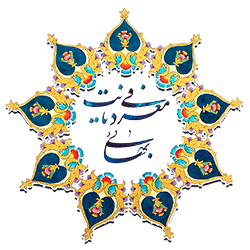It is clear and evident to thee that all the Prophets are the Temples of the Cause of God, Who have appeared clothed in divers attire. If thou wilt observe with discriminating eyes, thou wilt behold them all abiding in the same tabernacle, soaring in the same heaven, seated upon the same throne, uttering the same speech, and proclaiming the same Faith.
Such is the unity of those Essences of being, those Luminaries of infinite and immeasurable splendor. Wherefore, should one of these Manifestations of Holiness proclaim saying: “I am the return of all the Prophets,” He verily speaketh the truth. In like manner, in every subsequent Revelation, the return of the former Revelation is a fact, the truth of which is firmly established. Inasmuch as the return of the Prophets of God, as attested by verses and traditions, hath been conclusively demonstrated, the return of their chosen ones also is therefore definitely proven. This return is too manifest in itself to require any evidence or proof. For instance, consider that among the Prophets was Noah. When He was invested with the robe of Prophethood, and was moved by the Spirit of God to arise and proclaim His Cause, whoever believed in Him and acknowledged His Faith was endowed with the grace of a new life. Of him it could be truly said that he was reborn and revived, inasmuch as previous to his belief in God and his acceptance of His Manifestation, he had set his affections on the things of the world, such as attachment to earthly goods, to wife, children, food, drink, and the like, so much so that in the daytime and in the night-season his one concern had been to amass riches and procure for himself the means of enjoyment and pleasure. Aside from these things, before his partaking of the reviving waters of faith, he had been so wedded to the traditions of his forefathers, and so passionately devoted to the observance of their customs and laws, that he would have preferred to suffer death rather than violate one letter of those superstitious forms and manners current amongst his people. Even as the people have cried: “Verily we found our fathers with a faith, and verily, in their footsteps we follow.”
“باری، معلوم و محقّق آن جناب بوده که جميع انبياء هياکل امراللّه هستند که در قمائص مختلفه ظاهر شدند. و اگر به نظر لطيف ملاحظه فرمائی همه را در يک رضوان ساکن بينی و در يک هوا طائر و بر يک بساط جالس و بر يک کلام ناطق و بر يک امر آمر. اين است اتّحاد آن جواهر وجود و شموس غير محدود و معدود. پس اگر يکی از اين مظاهر قدسيّه بفرمايد: من رجوع کلّ انبياء هستم، صادق است. و همچنين ثابت است در هر ظهور بعد، صدق رجوع ظهور قبل. و چون رجوع انبياء موافق و مطابق آيات و اخبار ثابت شد رجوع اولياء هم ثابت و محقّق است. و اين رجوع اظهر از آن است که به دليل و برهان محتاج شود. مثلاً ملاحظه فرمائيد از جمله انبياء نوح بود که چون مبعوث به نبوّت شد و به قيام الهی بر امر قيام فرمود هر نفسی که به او مؤمن و به امر او مذعن شد او فی الحقيقه به حيات جديده مشرّف شد. و در حقّ او صادق می آمد حيات بديع و روح جديد، زيرا که او قبل از ايمان به خدا و اذعان به مظهر نفس او کمال علائق را به اموال و اسباب متعلّقه به دنيا از قبيل زن و فرزند و اطعمه و اشربه و امثال ذلک داشته به قسمی که اوقات ليل و نهار را مصروف بر اخذ زخارف و اسباب تعيّش داشته و همّت در تحصيل اشيای فانيه گماشته. و از اين مراتب گذشته، قبل از ورود در لجّه ايمان به حدودات آباء و اجداد و اتّباع آداب و شرائع ايشان چنان راسخ و محکم بود که اگر حکم به قتل او می شد شايد رضا می داد و راضی بر تغيير حرفی از امور تقليديّه که در ميان قوم بود نمی شد. چنانچه همه قوم نداء “إنَّا وَجَدْنَا آباءَنَا عَلَی اُمَّةٍ وَ إنَّا عَلَی آثارِهِمْ مُقْتَدُونَ.” برآوردند.”
قمائص: جمع قمیص، پیراهن ها/ آمر: امر کننده، دستور دهنده / اظهر آشکار تر/ متعلقه: آویخته، در آویزنده/ تعیش: زندگانی، معیشت، عیش و عشرت/ لجه: آب زیاد، جمعیت زیاد/ اتباع: پیروی کردن/
سورخ زخرف آیه ۲۳: “إنَّا وَجَدْنَا آباءَنَا عَلَی اُمَّةٍ وَ إنَّا عَلَی آثارِهِمْ مُقْتَدُونَ.” یعنی ما پدران خود را بر آئینی یافته ایم و ما از روش و آثار ایشان پیروی میکنیم.
کل آیه به این شکل است: “و كـذلك مـا ارسـلنـا مـن قـبـلك فـى قـريـه مـن نـذيـر الا قـال مـتـرفـوهـا انـا وجـدنـا ابـاءنـا عـلى امـه و انـا عـلى اثـارهـم مـقـتـدون”
علامه طباطبایی در تفسیر خود مینویسد:” يـعـنـى تـمـسـك بـه تـقليد اختصاص به اينان ندارد، بلكه، عادت ديرينه امت هاى مشرك گـذشـتـه نـيـز بـوده. و مـا قـبـل از تـو بـه هـيـچ قـريـه اى رسـول نـذيـرى يـعـنـى پـيـامـبـرى نـفـرسـتـاديـم، مـگـر آنـكـه تـوانـگـران اهـل آن قـريـه هـم بـه هـمـين تقليد تشبث جستند، و گفتند: (ما اسلاف و نياكان خود را بر دينى يافتيم، و همان دين را پيروى مى كنيم، و از آثار پدران دست برنمى داريم، و با آن مخالفت نمى كنيم ). و اگـر در آيـه مـورد بـحـث ايـن كـلام را تـنـهـا از تـوانـگـران اهـل قـريـه هـا نـقـل كـرده، بـراى ايـن اسـت كـه اشـاره كـرده باشد به اينكه طبع تنعم و نـازپـروردگـى اين است كه وادار مى كند انسان از بار سنگين تحقيق شانه خالى نموده، دست به دامن تقليد شود.”

